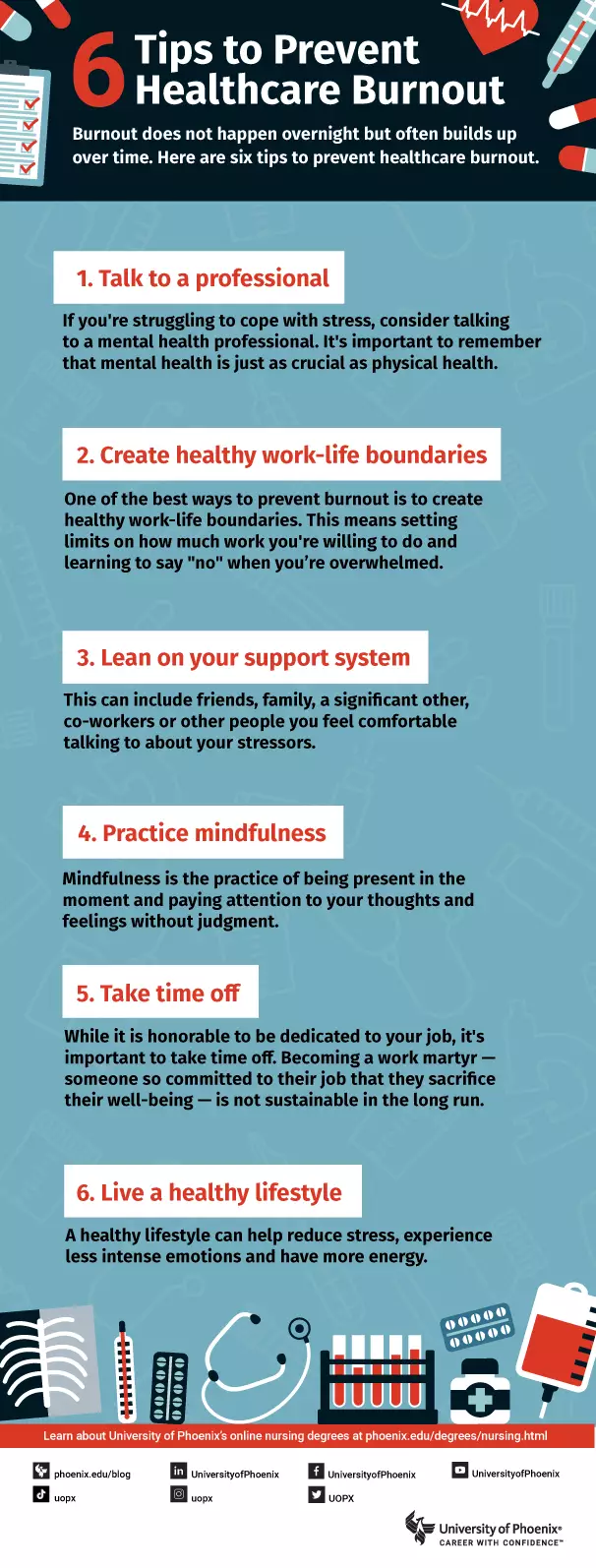6 tips for managing stress in healthcare careers

At a glance
- Working in healthcare can be stressful and cause burnout, but recognizing the signs and creating a healthy work-life balance may help prevent it.
- When needed, lean on a support system such as friends and family, or schedule time to speak with a mental health professional.
- Practicing mindfulness and embracing a healthy lifestyle are other ways to relieve stress.
- If youвҖҷre considering a new career path, °ДГЕМмМмІКҝӘҪұјЗВј offers a helpful resource page with career search guides.
Nurse burnout on the rise
Many positions in healthcare are stressful due to long hours, being on call and making important decisions. In 2019 the declared that burnout had reached a вҖңcrisisвҖқ level among nurses and physicians, with an estimated 35% to 54% of nurses and doctors suffering from burnout and 45% to 60% of medical students and residents expressing the same.
The . They were operating under conditions that were more challenging and dangerous than before. In addition to the physical dangers of catching the virus, healthcare professionals had to deal with emotional strain caused by seeing patients suffer while being limited in the ways they could help.
Just as doctors and nurses battled on the front lines of the COVID-19 pandemic, they will do so for future pandemics and health emergencies. That is why addressing healthcare workersвҖҷ mental health is more important than ever. If you work in healthcare, read on for ways to recognize signs of burnout and for tips to manage the stress that comes with the job.
Explore degrees that expand your skills and prepare you to lead in nursing.В
Recognizing the signs of burnout
Healthcare can be a fast-paced and stressful profession, which means it can be easier to miss the signs of burnout. For example, when nurses are busy taking care of others, they might overlook self-care. That, of course, is problematic on an individual level as well as a professional one: If nurses donвҖҷt make their own physical and mental health a priority, it can potentially impact patient care and job performance.
The symptoms of burnout may not always be obvious, so it is important to talk with administrators, managers and colleagues to help recognize and address stress and burnout. characterized by three main symptoms:
- Exhaustion: This can manifest as physical fatigue, mental exhaustion or emotional exhaustion, or all three.
- Cynicism and detachment: This may present as skepticism or negativity at work or feeling emotionally removed from patients.
- Lack of accomplishment: This can be characterized by hopelessness and a belief that your work is ineffective.
Burnout does not happen overnight; it builds up over time. Learning to identify the early warning signs is crucial to prevent it from worsening.
may include:
- Feeling irritable, hopeless or overwhelmed
- Losing interest in work
- Difficulty concentrating
- Decreased productivity
- Increased absenteeism
- A feeling of detachment from patients
6 tips for combating burnout
Though you may not experience all the above symptoms, it is important to be on the lookout for any changes in your mental state or behavior that could indicate burnout. Fortunately, there are ways to combat burnout before it becomes severe.
1. Talk to a professional
If youвҖҷre struggling to cope with stress, itвҖҷs important to talk to a mental health professional. However, many find this isnвҖҷt the easiest thing to do.
One reason healthcare workers might not seek mental health treatment is the , especially as it relates to impacting their careers.
Despite this challenge, try to remember that mental health is just as important as physical health, and seeking professional help can occur in several ways outside of a traditional appointment. Some additional resources available are:
- : Provides free therapy to front-line healthcare workers, such as individual and group counseling.
- : The University of North Carolina School of Medicine designed this free mobile app to help healthcare professionals and first responders access resources to take care of their mental health.
- : Provides free, licensed mental health assistance to healthcare professionals without insurance.
- : Provides mental health counseling for those who have served in the military or work as rare-disease caregivers.
read similar articles

Burnout in nurses: Symptoms, causes, recovery and prevention resources
2. Create healthy work-life boundaries
One of the best ways to prevent burnout is to create healthy work-life boundaries. This means setting limits on how much work youвҖҷre willing to do and learning to say вҖңnoвҖқ when youвҖҷre overwhelmed.
Sometimes you may feel pressure to take on an extra shift, but you have to ask yourself, вҖңIs taking this on going to negatively impact other parts of my life?вҖқ Finding a healthy balance is crucial to your mental and physical health.
Some tips for creating healthy work-life boundaries are:
- Create a вҖңwind-downвҖқ routine: This can be as simple as reading for half an hour before bed or taking a few minutes to meditate after work.
- Make time for hobbies: Dedicate time each week to doing things you enjoy outside work.
- Set limits with work: DonвҖҷt be afraid to say вҖңnoвҖқ if feeling overwhelmed.
Boundaries and limits are crucial for healthcare professionals, and itвҖҷs important to remember you canвҖҷt be effective at your job if youвҖҷre not taking care of yourself first.
3. Lean on your support system
Another way to prevent and deal with burnout is to lean on your support system. This can include friends, family, a significant other, co-workers or other people you feel comfortable talking to about your stressors. They can provide much-needed emotional support when youвҖҷre overwhelmed.
Tips for leaning on a support system include:
- Talk about stressors: Venting can help you feel better and may provide helpful perspective.
- Join a support group: There are groups for healthcare professionals struggling with burnout.
- Talk with peers: If you donвҖҷt feel comfortable talking with friends or family, try talking to a peer at work. This can help you feel less alone and may give you some helpful ideas for dealing with stress.
4. Practice mindfulness
and paying attention to your thoughts and feelings without judgment. Mindfulness can help you become more aware of your stressors and learn how to deal with them in a healthy way.
Tips for practicing mindfulness include:
- Focus on breathing: This can help you feel more grounded and present.
- Try guided meditation: Many apps and websites offer guided meditation to help you learn how to meditate.
- Practice being grateful: Take a few minutes to write down things youвҖҷre thankful for each day. This can retrain your focus on the positive aspects of life and ease your stress.
ItвҖҷs important to remember that mindfulness takes practice, so donвҖҷt get discouraged if itвҖҷs difficult at first. As with any skill, the more you practice mindfulness, the better youвҖҷll get at it.
read similar articles

5 ways to seriously boost your mental healthВ
5. Take time to unwind
While itвҖҷs honorable to be dedicated to your job, itвҖҷs important to use your vacation time or arrange your schedule so that you have dedicated days off work. Becoming a вҖ” someone so committed to the job that they sacrifice their well-being вҖ” is not sustainable in the long run. And as a healthcare provider you may particularly experience barriers to using your vacation time, such as:
- Guilt for leaving
- Understaffing
- Fear of being replaced
These are valid concerns, but itвҖҷs important to remember that vacation time can be essential for improving your mental health. This doesnвҖҷt necessarily mean you need to take two weeks off to go to the Caribbean. It could just mean taking a day or two off here and there to unwind at home.
This approach could also mean switching shifts with a co-worker to better accommodate your current mental health needs. Even taking one day off when youвҖҷre feeling overwhelmed can help significantly lower stress.
6. Practice a healthy lifestyle
A , experience less intense emotions and have more energy. Small lifestyle changes can make a big difference.
A healthy lifestyle has many facets, but some of the most important ones for mental health are:
- Diet: Healthy foods fuel the body.
- Exercise: Exercise releases endorphins, which have mood-boosting effects.
- Sleep: Getting enough sleep is essential for mental health.
- Hydration: Staying hydrated helps the body function properly.

Understand when it might be time to change specialties or careers
Understanding the distinction between burnout and the need for a different concentration in nursing or even a new career is crucial. While burnout can result from many factors, such as job stress, it doesnвҖҷt necessarily mean you should quit. To understand whether youвҖҷre experiencing burnout or if itвҖҷs time to find a new role in the workforce, ask the following questions:
- Do I still enjoy going to work?
- Do I feel like my job is making a positive impact?
- Do I feel like I have a good work-life balance?
If the answer was вҖңnoвҖқ to any of these questions, it might be time to consider a new career. While this may be scary for those with career experience and a bachelorвҖҷs degree in nursing or a Master of Science in Nursing degree, it doesnвҖҷt have to be. There are many alternative careers for registered nurses and even more careers that involve helping people.
read similar articles

5 ways to seriously know itвҖҷs time to change jobsВ
A few tips for switching careers:
- Research career options: Many websites offer information on various careers, such as salary, job outlook and required education.
- Network: Talk to people in the field youвҖҷre interested in and get their advice.
- Earn additional education: If youвҖҷre interested in a career that requires a higher level of education than you currently have, consider returning to school.
- Volunteer: Volunteering is a great way to gain experience in a new field.
With careful planning and research, career-driven nurses and other healthcare providers can be on the right path to finding a new role thatвҖҷs a better fit. If youвҖҷre considering a career change, check out the °ДГЕМмМмІКҝӘҪұјЗВјВ resource page, which offers a career-change guide and many other job search resources.


